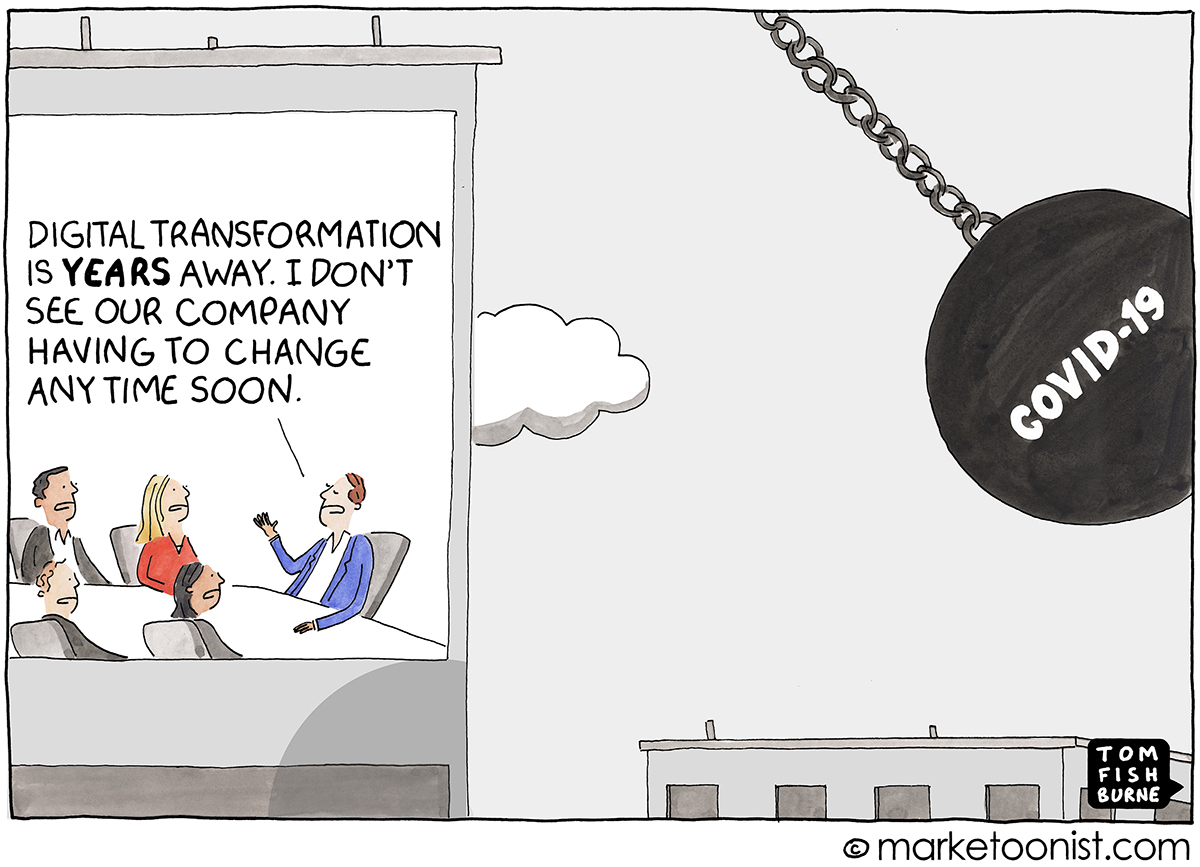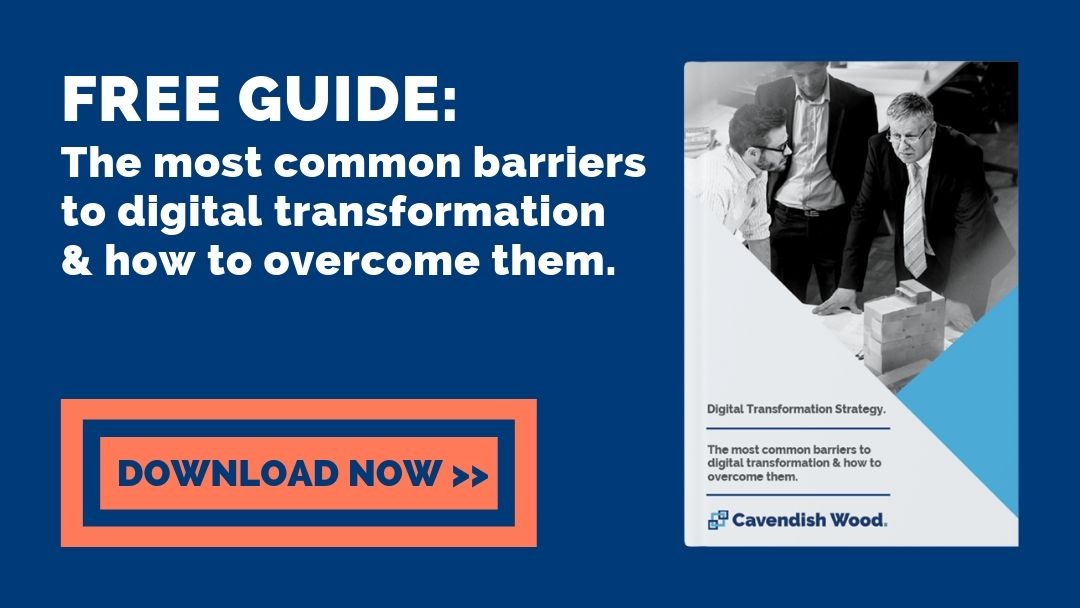%20to%20Increase%20Your%20Investment%20During%20Covid-19%20-%20Cavendish%20Wood.jpg?width=800&name=Digital%20Transformation_%20Why%20(and%20How)%20to%20Increase%20Your%20Investment%20During%20Covid-19%20-%20Cavendish%20Wood.jpg)
“Why do all good things come to an end?” sang Nelly Furtado in 2007. It’s not only the good things that end, though. Bad ones such as the Covid-19 coronavirus pandemic also eventually get laid to rest. And when that time comes, the question you’ll want to be able to answer will be “how well did you use the time you had?”
Companies that aren’t involved in essential services during the pandemic have an unprecedented opportunity now to boost digital transformation. It’s not only because you’ve had to pivot to telework at lightning speed, but because you have the chance to invest in rejigging your workplace for a new digital future. By accelerating your digital transformation now, you’ll be in a much better position once the pandemic passes.
5 Top reasons to invest in digital transformation.
Digital transformation is the integration of digital technology into all aspects of your business, resulting in fundamental changes to the way you operate and deliver value to your customers. Investing in it doesn’t only mean financially, although that’s a big part of it. It’s also an investment of time, energy and your company’s culture, which needs to adapt to enable adoption of any new technology.
So, why is now such a good time to do this? Some reasons are:
- You’ll be better able to take advantage of pent-up demand after the pandemic. Sure, some industries will take a long time to recover from the recession caused by Covid-19, but others will be forging ahead based on the lessons they learned during this time. Digital transformation will be front and centre of most companies that are still standing.

- Transformation will boost your business resiliency. If we’ve learned anything from this pandemic, it’s how quickly the world can change without warning. This cartoon used in Scott Brinker’s keynote address at Discover Martech, a virtual marketing technology conference held in April 2020, shows how unaware many companies were just a short couple of months ago:

Business continuity plans (BCP) and disaster recovery planning (DRP) are worthy goals in their own right. Without digital transformation, however, implementing BCP and DRP strategies will be challenging, if not impossible!
- Digital transformation is vital for improving your customers’ experiences. Consumers these days want quality, personalised experiences from the beginning of their interaction with a company to the end. Without data and digitisation, it’s simply not possible to offer this level of customisation. Transformation offers you greater customer insights, which in turn allow you to create digital products and services to meet their needs. In the financial services world, for example, one of the criteria that could end up being used during this period of social distancing is which institutions clients can use without leaving home.
- Manage financials better. Digital transformation is reinventing finance and accounting operations. In invoice management, for example, artificial intelligence can optimise your working capital, manage revenue, expenses, and cash flow. Using predictive technology, business owners know with 95% accuracy when specific invoices will get paid. This allows faster collection of payables and quicker resolution of payment issues, among other things.
- Investing in digital transformation during the pandemic downtime is also a way to make sure you don’t lose ground. Human nature being what it is, it could be easy for employees based in unfamiliar work surroundings to slip back into old ways and lose gains you’ve made already. Instead, by doubling down on transformation you can turn this time into a valuable investment period.
During the pandemic we’ve seen the immense ROI that IT and digital transformation deliver to businesses. A survey by IDC showed that in spite of the negative impacts of Covid-19, companies were very aware of the positive impacts, too. These included the ability to do long-distance, collaborative work, the rising importance of online marketing activities, and the wide recognition of the value of digital transformation among employees.
4 Ways to Invest NOW in Digital Transformation.
So what are some of the things you can do while the world is in lockdown? Quite a lot, surprisingly. It’s time to rethink your digital transformation initiatives in ways that will enable you to do more with less, especially in the aftermath of the huge losses companies are going to sustain for Q1-Q2/2020. Here’s how:
#1: Identify any processes overdue for transformation.
If you’re still doing paper-based processes for functions such as banking, invoicing, procurement, distribution, etc., then stop. Converting these procedures to a digital format helps you to:
- stay organised,
- streamline your system,
- increase security and access
- provide accurate reporting and real-time data
- retrieve important information easily.

Keeping hard copies of anything is tedious, and you run the risk of your documents being lost, destroyed or stolen. If you have already considered or begun the digital transformation of any operational processes, these are low-hanging fruit you can pluck for a quick win.
#2: Become a disruptor.
In the digital age, things move fast. The technology and competitive landscape around you are shifting, and it’s important to make sure you swim with the tide rather than against it. Put your customers first, and find out what your competitors are offering that you aren’t. Identify the gaps between where you are now and where you want to be. Look for new ways to engage your customers, partners, and suppliers, and develop a roadmap to work from.
#3: Develop an interim roadmap.
This requires having a broad strategy to start with, which you may already have compiled. If so, consider what measures you need to put in place as a matter of urgency. Now is not the time to simply survive, but to crack on and build the stuff that’s needed.
For starters, companies are expected to continue working from home until we discover a vaccine or treatment, or reach a herd immunity level. That means investing in video conferencing and collaboration software is essential.

Automating labour-intensive processes through software initiatives gives you the ability to scale up or down. This makes it easier to manage your resources in a volatile situation, without having to continuously adjust the size of your workforce in response. These initiatives need a large initial investment, but usually have minimal ongoing or variable costs.
#4: Review your system security.
One of the hazards that accompanied the arrival of Covid-19 was the threat to cybersecurity. In every industry and at every level, hackers are taking advantage of the outbreak to deliver malware, steal banking information, and gather personally-identifiable information (PPI).
There are ways to stay safe from these attacks, but it’s important to build the highest level of security into your digital transformation from the outset.

Having multiple employees working from home leaves companies open to various forms of cybercrime, including social engineering. Virtual private networks (VPNs), controlled access to data, versioning software and backups are all vital factors in digital transformation.
The tragedy of the Covid-19 pandemic will have lasting repercussions for both people and businesses in the coming months and years. It has shown us the value of IT and digital transformation. Companies need to use this time to invest in digital transformation that accelerates building the resilience and systems they need without delay, if they want to not only survive but thrive in the new reality.

